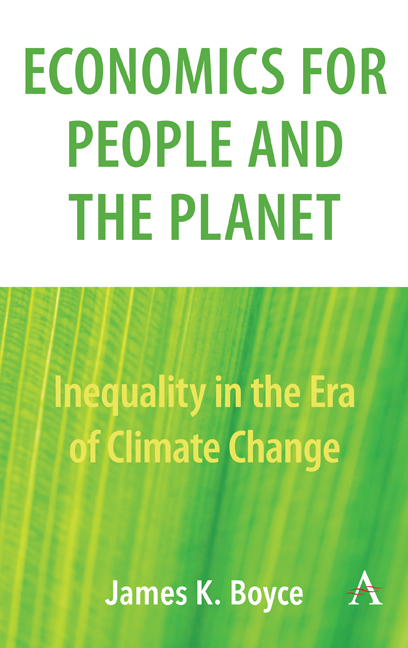Book contents
- Frontmatter
- Contents
- List of Illustrations
- Acknowledgements
- Part I Rethinking Economics and the Environment
- Part II Environmental Injustice
- Chapter 9 Inequality and the Environment
- Chapter 10 Clean Air for All
- Chapter 11 Letter from Flint
- Chapter 12 Let Them Drink Pollution?
- Chapter 13 Letter from Delhi
- Chapter 14 Mapping the Environmental Riskscape
- Chapter 15 Measuring Pollution Inequality
- Chapter 16 Cleaning the Air and Cooling the Planet
- Part III Climate Policy
- Notes
- Publication History
- Index
Chapter 16 - Cleaning the Air and Cooling the Planet
from Part II - Environmental Injustice
Published online by Cambridge University Press: 12 February 2019
- Frontmatter
- Contents
- List of Illustrations
- Acknowledgements
- Part I Rethinking Economics and the Environment
- Part II Environmental Injustice
- Chapter 9 Inequality and the Environment
- Chapter 10 Clean Air for All
- Chapter 11 Letter from Flint
- Chapter 12 Let Them Drink Pollution?
- Chapter 13 Letter from Delhi
- Chapter 14 Mapping the Environmental Riskscape
- Chapter 15 Measuring Pollution Inequality
- Chapter 16 Cleaning the Air and Cooling the Planet
- Part III Climate Policy
- Notes
- Publication History
- Index
Summary
Reduced use of fossil fuels brings cleaner air as well as a cooler planet.
There is good news and bad news about the clean energy transition. The good news is that half of the new electric-generating capacity installed worldwide in 2008– 2010 was renewable. The bad news is that half wasn't.
To avoid rapid global warming and its attendant human and economic risks, we need to accelerate the transition. We need to do more than slow the growth in use of fossil fuels: we need to cut their use substantially. This will require significantly ramped-up investments worldwide in energy efficiency and clean energy.
One way to encourage this investment is to base public policies on the full range of benefits from reduced burning of fossil fuels–not only global benefits from reduced greenhouse gas emissions but also local benefits from reduced emissions of particulates, nitrogen oxides, sulfur dioxide, carbon monoxide, mercury, benzene and other toxic pollutants.
In the European Union, research has shown that the clean air benefits alone are sufficient to justify investments in energy efficiency and renewables. ‘The welfare effects of climate policy seem to be positive,’ a 2006 report for the Netherlands Environmental Agency concluded, ‘even when the long-term benefits of avoided climate impacts are not taken into account’ (emphasis added).
The clean air co-benefits of climate policy may be even greater elsewhere, in countries with less stringent air pollution controls than Europe. World Bank data indicate that in the United States the human health damages from particulate emissions are six times higher per ton of carbon dioxide than the average for Germany, France and the United Kingdom. In China, the ratio is more than ten times higher.
It would be ironic if energy policies designed to internalize the external costs of greenhouse gas emissions were to ignore the external costs of copollutants. But there is an important difference between the two. The benefits of reduced greenhouse gas emissions are global, whereas air quality benefits of reduced co-pollutant emissions are local.
The difference matters for three reasons:
Efficiency: From a climate change standpoint, it doesn't matter where emission reductions occur. From an air quality standpoint, it can matter a lot. Co-pollutant damages vary depending on the type of fossil fuel, pollution control technologies and the population density of the surrounding area.
- Type
- Chapter
- Information
- Economics for People and the PlanetInequality in the Era of Climate Change, pp. 75 - 76Publisher: Anthem PressPrint publication year: 2019



